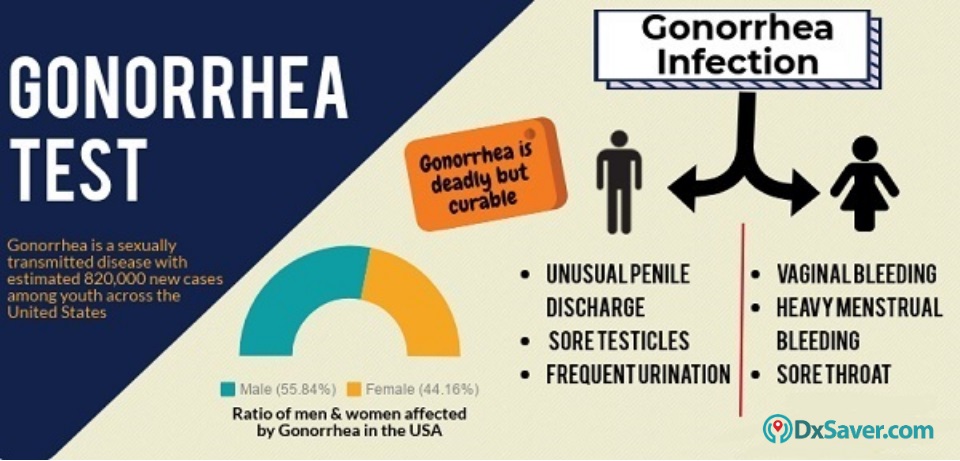
According to the Centers for Disease Control and Prevention (CDC), Gonorrhea is the second most commonly reported disease in the United States. But, still, many cases of Gonorrhea continue to go unreported and undiagnosed as the symptoms do not show up at an earlier stage. In many cases, even if the symptoms show up, people ignore them as if they are some bacterial infections. So we highly recommend every sexually active young person get tested for Gonorrhea at least once a year.
The article below covers all the relevant topics of Gonorrhea disease like Gonorrhea test cost, transmission, gonorrhea symptoms in women & in men, complications, gonorrhea prevention, and how to get tested for Gonorrhea sitting at home.
- Gonorrhea test cost.
- What is gonorrhea infection?
- How is gonorrhea transmitted?
- Gonorrhea signs.
- How is gonorrhea infection diagnosed?
- Is there any preparation required before the test?
- Gonorrhea cure.
- What happens if Gonorrhea is left untreated?
- Gonorrhea prevention.
- Provider Locations.
For our readers who are interested in booking the Gonorrhea screening test, we have covered the Gonorrhea test cost out of the way.
How much does the Gonorrhea test cost?
Gonorrhea test cost ranges between $49 and $99 in the different labs and facilities across the US. No prior appointment is required. Compare the price, order your test online and visit the lab near you during lab business hours. Complete the procedure and get the results in your email in 2 to 3 business days.
The following table shows the Gonorrhea home test kit and Gonorrhea test cost at 3 of our partner laboratories (CLIA – Certified) network located across the U.S.
Name of our Partner Labs | Book Online |
STD Check Labs
| Starting from
$49 |
LetsGetChecked(Home Test Kit)
| Starting from
$74.25 |
HealthLabs
| Starting from$59 |
Gonorrhea test cost with insurance
Many health insurance policies in the US do not cover the preventative screening tests of sexually transmitted diseases including Gonorrhea when the symptoms do not appear. The cost of the advanced tests might be covered by your health insurance policy.
Our STD testing providers offer a screening test for Gonorrhea and do not accept any health insurance policy. But, on request, they may provide all the required details like name and test of the code and CPT code for necessary for insurance reimbursement purposes.
What is Gonorrhea?
Gonorrhea infection is the second most common sexually transmitted disease in the US. It is caused by a bacterium called Neisseria gonorrhoeae or gonococcus. This bacterium infects the warm and moist areas of the body like the urethra, rectum, eyes, vagina, and throat in both men and women. However, men are prone to this infection showing some symptoms like swollen testicles and penile irritation. Gonorrhea is also referred to as “the clap” because, in the earlier days, people believed that clapping the hands hardly on both sides of the penis could expel the pus secreted due to the infection and cure it.

People with Gonorrhea infection can also be affected by Chlamydia at the same time. As the pattern of transmission, symptoms, procedure, and risks are almost the same for both Chlamydia and Gonorrhea, we recommend everyone testing for Gonorrhea to be tested for Chlamydia as well.
The Centers for Disease Control and Prevention (CDC) also recommends that patients infected with Gonorrhea should be treated for Chlamydia as well.
What is a gonorrhea test?
This test is done in two stages.
1. Gonorrhea screening test:
It is done to check the presence of the bacterium in the body in which the test results may be positive or negative.
2. Gonorrhea advanced test:
If the test results are positive, Gonorrhea advanced tests will be done to know the exact stage of infection.
How is gonorrhea transmitted?
Gonorrhea is transmitted through unprotected sexual contact with the infected person which includes anal, vaginal, or oral sex and sharing unwashed sex toys. As this bacterium cannot live outside the human body for a few seconds, Gonorrhea cannot be spread through casual contact like touching the clothes or sitting on the toilet seat.
A woman with Gonorrhea can pass on the infection to her newborn child at birth (only during vaginal delivery). Babies born by C-section cannot get it from their infected mother. Younger men and women who are sexually active are more prone to gonorrhea infection. The new research published in “The Lancet Infectious Diseases” tells that mouth kissing can also be an important risk factor in the transmission of this bacterial infection and this can be prevented by a good quality anti-bacterial mouthwash. So we highly recommend everyone above the age of 16 to get tested for Gonorrhea at least once a year.
Oral Gonorrhea
When the gonorrhea infection is transmitted through oral sex, it is called oral Gonorrhea. Oral sex with infected persons affects the mouth, eyes, and throat.
What are the Gonorrhea signs and symptoms?
Some people may experience the symptoms of Gonorrhea within 15 days of initial exposure whereas some do not experience any signs until the advanced stage of infection.
Gonorrhea symptoms in women
- Unusual vaginal discharge (dark green or yellow color)
- Severe abdominal and back pain
- Bleeding during sexual intercourse
- Heavy periods
- Vulvar (outer part of the vagina) swelling
Gonorrhea symptoms in men
- Unusual penile discharge
- Swollen testicles
- Inflammation around the penis
- Pain while urinating
Common symptoms
- Swelling in the neck lymph nodes
- Anal discharge
- Fever
- Sore throat
- Pain in the eye
- Sensitivity to light
- Painful joints
- Bleeding or pain with passing bowel movements

How is Gonorrhea test performed?
If you experience any symptoms mentioned above or if you suspect of having the gonorrhea infection, then have a talk with your physician. He may recommend you to test for Gonorrhea. Generally, the Gonorrhea test is done using the urine sample or cotton swab. The cotton swab picks the sample of discharge and cells from the infected area either in the vagina, penis, anus, throat, or urethra. Men are usually asked for urine samples. The collected sample is then sent to the lab for analysis.
Self-collection of samples at home is also possible with Gonorrhea test kits offered by some labs across all the cities in the United States.
Gonorrhea test time
When you experience any of the above-mentioned symptoms, you should get tested immediately. Gonorrhea infection might show up on tests within 2 to 6 days after exposure. It is very common to not experience symptoms at an earlier stage of infection. So it is highly recommended to test after every potential exposure. To ensure more accurate results, we recommend waiting 2 weeks after potential exposure to get tested.

Is there any preparation required before the test?
You should not urinate for at least one hour before the test. No other special preparation is required to test for Gonorrhea infection.
Gonorrhea cure
If your test results are positive, antibiotic medications are used as a gonorrhea cure. This infection can be easily treated by antibiotic therapy involving a single antibiotic tablet or an antibiotic injection of Ceftriaxone. Gonorrhea can be diagnosed easily at an earlier stage of infection. You are advised to make sure your recent partners are also tested and not to have sex until you are completely treated and cured.
Your physician may ask you to do the follow-up test after two weeks to ensure you have completely gotten rid of the infection. It is also important to get your recent sex partners treated and not to have sex with them till 7 days of their treatment.
What happens if Gonorrhea is left untreated?
If left untreated, gonorrhea can cause severe health problems in both men and women. There are greater chances of getting HIV infection if not treated at an initial stage.
Complications in women
In women, Gonorrhea leads to Pelvic Inflammatory Disease (PID), an infection in the uterus, vagina, and fallopian tubes. PID causes severe pain and damage to the reproductive organs. During the pregnancy period, it may cause miscarriage and premature childbirth. Women may also get ectopic pregnancy (fertilized egg grows outside the uterus).
Complications in men
In men, the severity of gonorrhea leads to epididymitis, an inflammation in the tube present at the back of the testicle that stores and carries sperm. This condition may ultimately result in infertility. Men may also experience permanent tissue marks in the urethra.
Rarely, gonorrhea spreads to other parts of the body causing
- Inflammation in the joints
- Irritation and redness in the skin
- Inflammation around the brain, spinal cord, and heart
Gonorrhea prevention
Practicing safe or protected sex is the most efficient measure for Gonorrhea prevention
- Don’t share the sex toys, if shared, wash them before using them.
- Monogamy – not having sex with strangers or people other than your husband/wife
Sexually active people are advised to take the gonorrhea test at least once every year. It is important to do follow-up tests to get rid of reinfection.
Provider Locations
A gonorrhea test can be done in any of the following states either at the provider’s location or home. To know the Gonorrhea test cost in these locations, refer to the first section of this article.
- Alabama
- Arizona
- Arkansas
- California
- Colorado
- Connecticut
- Delaware
- Florida
- Hawaii
- Georgia
- Idaho
- Illinois
- Indiana
- Iowa
- Kansas
- Kentucky
- Louisiana
- Maine
- Michigan
- Minnesota
- Mississippi
- Missouri
- Montana
- Nebraska
- Nevada
- New Hampshire
- New Mexico
- North Carolina
- North Dakota
- Oklahoma
- Oregon
- Pennsylvania
- Puerto Rico
- South Carolina
- South Dakota
- Tennessee
- Texas
- Utah
- Vermont
- Virginia
- Washington
- West Virginia
- Wisconsin
- Wyoming
Frequently Asked Questions
Will insurance cover my testing cost?
No, insurance will not be covered in the billing. However, they will provide you a receipt for insurance reimbursement purposes.
How should I book my appointment?
You can choose the most suitable provider from above and make an appointment by following the instructions mentioned by them.
Can I cancel my lab test order?
Yes, you can cancel your lab test order anytime before your testing. A refund will be initiated after deducting the cancellation fee. However, cancellation is at the discretion of the provider.
Do the providers offer result interpretations?
Yes, a few providers may provide doctor consultation who will take you through the results and provide clarification if needed.
How do I receive my report?
To ensure your privacy, the test report will be mailed to you by the provider.
Other topics you may be interested in:-
- At-Home Chlamydia Testing Cost in the US
- Cost of STD Test in Florida | Same Day Test Result.
- How much does the LDH Testing Cost in the U.S?
- What STDs cause blood in urine?
- GGT, Gamma-GT Blood Test Cost in the US
- Types of STDs that cannot be cured
- What are STDs symptoms? | What STDs cause dry skin?
- ESR Testing Center near me
- Symptoms of Gluten Intolerance
- ANA Test Cost in the US
- Cost of Syphilis Test in the US
- Complete Blood Count, CBC Testing & Test Results Interpretation
- How much does the Mononucleosis (mono) Test Cost in the U.S?
- Vitamin D Test Cost in the U.S.
- Types of STDs That Cause Skin Rashes on Genitals and Body
- Oral STDs: Names, Symptoms, Treatment and Testing Cost
- Causes of Penile Rashes and Other STD Symptoms in Men
- Importance of Hemoglobin A1C Normal Levels, Diagnosis & Treatment





